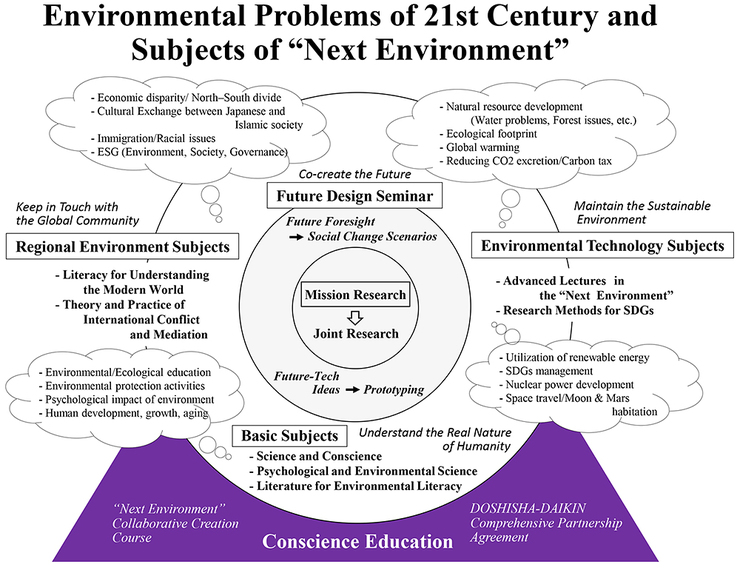About course
Based on the agreement for comprehensive cooperation between Doshisha University and Daikin Industries, Ltd., we have established the Next Environment Collaborative Creation Human Resource Development Program (hereinafter, “the Program”).
The Program aims to develop people and human resources who can propose and achieve the “Next Environment” that breaks the environmental impasse which has resulted from focusing only on science and technology and is a common issue for graduate students at Doshisha University and employees of Daikin Industries. The Program will be implemented from the 2021 academic year.
Subjects related to the Program will be established in the group of Advanced Liberal Arts Subjects, which is a new graduate education program at the Institute for Advanced Research and Education, and can be taken systematically as the Next Environment Collaborative Creation Course (hereinafter, “the Course”). We expect that graduate students at Doshisha University and employees of Daikin Industries will further heighten the effect of education by studying together and challenging each other to do better.
'Next Environment Collaborative Creation Course
Advanced Liberal Arts Subjects
Course Philosophy
In order to meet the demand for open innovation from the industrial sector, we will share new developments in forms of learning achieved through the fusion of the natural sciences and the humanities/social sciences, which is the aim of Doshisha University. We will construct a collaborative system between organizations centered on collaborative creation which transcends the boundaries between universities and corporations. Furthermore, we will develop people and human resources who can propose and achieve the “Next Environment,” which breaks the environmental impasse that has resulted from focusing only on science and technology.
Course Characteristics
- From the perspective of “conscience,” which is the fundamental principle of Doshisha’s education, participants will study Fundamental Subjects, Regional Environmental Subjects, and Environmental Technology Subjects, and put what they learn into practice through Future Design exercises and Mission Research.
- In Future Design exercises, based on free dialogue between students and working professionals with various interests, participants will co-create the ideal form of future consumers and the new technological ideas that will be required.
- For participants with higher aspirations, by committing themselves to a theme as mission research, they will form concrete concepts for the realization of ideas and propose joint research.
Subjects in the Course
|
Educational Couse Next Environment Collaborative Creation Couse Gallery |
